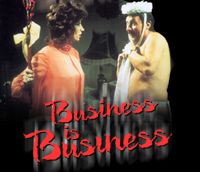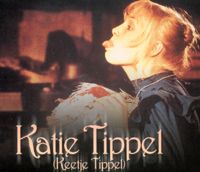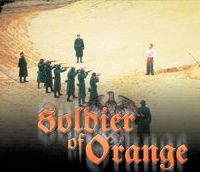




     |
If you've seen Verhoeven's Dutch films, you'll likely be less surprised by the more outrageous elements of his American output--such as the infamous interrogation room scene from Basic Instinct. With a candor largely foreign to American audiences, Verhoeven films his characters at their most vulnerable. For example, in The 4th Man, Jeroen Krabbé plays an alcoholic writer who trembles upon waking after a drinking binge and stumbles through his house with his stark-naked lower extremities clearly on display, and in Turkish Delight, Monique Van de Ven reacts in horror when she defecates and her stool is red. Rutger Hauer as her boyfriend rummages through her stool for clues to her ailment. Dutch critics were indeed shocked by scenes like these, but they also admired Verhoeven's flair for using traditionally taboo subject matter in ways that help us better understand his characters. Anchor Bay Entertainment has released on DVD five of Paul Verhoeven's Dutch films--Business is Business (1971), Turkish Delight (1973), Katie Tippel (1975), Soldier of Orange (1977), and The 4th Man (1983). (Only Verhoeven's Spetters [1980] is missing.) These DVDs come complete with audio commentary by Verhoeven, trailers, and lengthy talent bios on the principal players. These discs represent an excellent opportunity for people only familiar with Verhoeven's American output to find out about his early career. And for those people already familiar with Verhoeven's Dutch output, these discs represent an outstanding opportunity to see these movies in first-rate widescreen transfers.
Paul Verhoeven made his feature film debut with Business is Business (also known as Diary of a Hooker and Any Special Way), a bawdy, outrageous look at Amsterdam's Red Light district. Producer Rob Houwer reportedly put together the production with the intent of creating an "adults only" feature, and while the resulting movie is hardly appropriate subject matter for children, neither is it pornographic. The movie contains plenty of sex scenes, but none of the scenes are meant to titillate. Instead, Verhoeven emphasizes the characterizations and the awkwardness that goes with their profession. The movie focuses on Blonde Greet (Ronnie Beirman), a head-strong prostitute who knows all the angles. Her customers bring to her a wide range of sexual fetishes and fantasies, which she typically satisfies in a world-weary, seen-it-all-before fashion. But she's touched by two relationships in the course of this movie: 1) her budding relationship with a married man (Piet Romer) who treats her with respect and 2) her working and private relationship with her best friend, Nel (Sylvia de Leur), a prostitute who is regularly beaten by a brutish boyfriend (Jules Hamel). Blonde Greet is hardly an ingratiating character. She can be brusque and short tempered. But she can also be a committed friend. She encourages Nel to breakaway from her abusive boyfriend, and she applies the support that helps makes this possible. At the same time, however, she experiences confused feelings once her friend becomes engaged to a kind (but dull) salesman (Bernard Droog). She knows she may lose a close friend and that causes her to be possessive. Verhoeven doesn't exactly treat his characters with warmth; he's much too blunt a filmmaker for that. But he nonetheless does exhibit compassion in the way he keeps the emphasis on a comedic tone that emphasizes Blonde Greet's strength and the absurdity that she courts daily while plying her trade. Business is Business is somewhat slight compared to Verhoeven's subsequent Dutch films. Its quirkiness is occasionally labored and its attempts at sexual forthrightness occasionally become forced. Nonetheless, Business is Business was a formidable effort and its widespread popular success in Holland helped revolutionize the Dutch film industry. Anchor Bay's DVD gives Business is Business a widescreen presentation (aspect ratio 1.66:1) that has been enhanced for 16x9 televisions. The disc includes an audio commentary track by Verhoeven, a theatrical trailer, and a stills gallery.
Rutger Hauer first worked with Paul Verhoeven on a twelve-episode Dutch television series titled Floris (1969). This well-received show was a turning point in both their careers. Four years later, Verhoeven thought of Hauer as he began planning his next feature film, an adaptation of a best-selling novel by Jan Wolkers, Turkish Delight. The movie required a bold and uninhibited leading man, so Verhoeven immediately turned to Hauer. The resulting movie garnered even greater commercial success than Business is Business, becoming the highest grossing film in Dutch history. Turkish Delight isn't a likely box-office success. Its two leading characters aren't even particularly likable. Erik Vonk (Hauer) habitually insults the women he picks up and beds. He kicks them out of his apartment as soon as he's done with them. But then Verhoeven feeds us scenes from the past and we see Vonk's relationship with a vivacious young woman (Monique Van de Ven) who eagerly meets his appetites. They do exactly as their whims take them--like two kids with no id. She's just as hedonistic as he is. But we become interested in these characters because Vonk's infatuation with Olga quickly turns into love. It's amazing how much bad, boorish behavior we can forgive when love-at-first-sight is involved. Vonk and Olga are seemingly meant for each other. They rarely argue. They enjoy very frequent sex, and their sexual relationship leaves them both satisfied. However, while Vonk is an incorrigible rogue, Olga is mentally unbalanced (as we gradually learn). She has a brain tumor. Occasionally, she stops what she's doing and just stares into space, becoming near catatonic. Eventually her behavior becomes erratic and she leaves Vonk--complaining that all he wants is sex ten times a day. He is devastated and can hardly function, but once her illness becomes known he re-enters her life. Verhoeven films this story with great candor. He shows us his lead characters, frequently buck naked, as they cavort at Vonk's pad or in her bed at her parent's house or in an auto parked beside a highway. Verhoeven coaxes very naturalistic performances out of his stars who appear completely at ease in their sex scenes, which are surprisingly explicit (showing everything but the workings of genitalia). This explicitness is one of the hallmarks of Verhoeven's cinema. He isn't afraid to show anything on a movie screen if he thinks it will help him to tell a story. For example, Vonk's devotion to Olga is so strong that he would submit to anything she desires. At one point, he offers to lick her clean as she sits on a toilet--and he is only half joking. For Vonk, such an act would have nothing to do with degradation. Instead, it would simply be a show of his intense love. At times, however, Verhoeven's attraction to waste and decay also compelled him to make choices that are hard to defend, such as the close-up of a dog defecating on the street or the horrendous death bed scene for Olga'a father (his bedding drips from his excrement). In these cases, as he juxtapositions life and decay, Verhoeven resembles a bad boy wanting to shock his audience. Much of the burden for making Turkish Delight succeed rests on the shoulders of Hauer and Van de Ven, and they both deliver astonishing performances. Hauer is alternatingly intense and playful. He makes Vonk an intriguing mass of contradictions. He's part an unflinching boor and part a vulnerable lover. Van de Ven was only 19 years old when she played the role of Olga. But she delivers a remarkably assured performance as she captures Olga's intensity and lack of inhibitions. Van de Ven tried to make the transition to American films but the right roles never came her way and eventually she returned to Europe, where she remains busy today in films. Anchor Bay's DVD of Turkish Delight presents the movie in 1.66:1 format, enhanced for 16x9 televisions. The disc includes audio commentary by Verhoeven, a theatrical trailer, a stills gallery, and talent bios.
For his third feature film, Katie Tippel (also known as A Girl Called Katy Tippel and Keetje Tippel), Paul Verhoeven turned to the memoirs of Neel Doff, a Dutch woman who rose from poverty and prostitution to achieve great wealth and status. She was one of the elder daughters of a poor family. Her father had trouble keeping a job, and with few means of support, the family turned to alternative ways of putting food on the table. The eldest daughter was recruited into prostitution, a role she eagerly accepted because it gave her power in the family. Everyone had to cater to her whims because she was the main breadwinner. And eventually Katie herself was forced to follow her sister's footsteps. However, regardless of the squalor she lived in and the profession she was forced to assume, Katie had integrity. She was the only one in her family who could read and write (we see her reading Jules Verne's 20,000 Leagues Under the Sea). And this integrity, combined with her astonishing beauty (which shows through regardless of the dreary rags she wears), helped provide her with the means of finding a better life. Verhoeven's approach to this material becomes obsessive in its insistence on finding ways to focus on sex in nearly every scene. In his first movie after Turkish Delight, Verhoeven found himself compulsively focusing on sexual matters to the exclusion of other character details--as if he couldn't shake his previous movie from his mind (as he freely admits on the audio commentary track of Anchor Bay's DVD release of Katie Tippel). However, in this case, the story required a wider, more ambitious focus. Katie (Monique Van de Ven) is eventually drawn into politics, and therefore, matters of capitalism vs. socialism frequently get sprinkled into the movie. But Verhoeven's focus lazily keeps drifting back to sex; everyone wants Katie, even the bathhouse girl who shampoos her hair and the girl she meets during her brief stay at a hospital. Verhoeven and cinematographer Jan de Bont attempted a painterly approach, as Roman Polanski would do with greater results in Tess, but their meager budget kept them from fully realizing their plans. They strove for the epic sweep of David Lean (as in Doctor Zhivago), but their crowd scenes never acquire much strength, as when a socialist march meets a phalanx of soldiers. Nonetheless, Katie Tippel is still an impressive film. It effectively delineates a portrait of workers who are constantly used and abused by the capitalist system. One of Katie's first jobs is in a factory where cloth is dyed. Along with a dozen other workers, she must dip cloth into a pool of acidic liquid that burns their hands and makes their fingernails bleed. The factory has no concern for the health of the workers, and Katie immediately realizes how she is being exploited. When her co-workers haze Katie by forcing her to sing, she responds by singing a political song. But tellingly, her co-workers aren't interested in the song's message. They begin singing a simple patriotic hymn to drown her out. In Katie Tippel, the lower classes, the people who would most benefit from a revolution against the capitalist status quo, aren't interested in change. It's the artists and the intellectuals who fight for better working conditions. Rutger Hauer stars as a fun-loving loan manager who hobnobs with the rich. Katie is charmed by his exuberance for life, so when he suggests that she should move in with him, she accepts his offer. When he adds the none-too-sensitive condition, "until I tire of you," Katie grins and replies, "or I you." By moving in with Hugo, Katie turns her back completely on her own family. When she goes home one last time to pick up her things, her mother grabs at her and says she can't leave. But Katie is determined. "How can we feed the children?" asks her mother. "You shouldn't have screwed so much!" says Katie. When she then walks out, Katie never sees her family again. Significantly, Verhoeven originally intended to film a framing sequence for Katie Tippel in which we would learn that after Katie gained wealth and status she never donated money or goods to charity. In fact, just being around poor people would leave her nauseous. This sequence fell victim to the movie's low budget. I can't say I'm disappointed that this scene was never filmed. The Katie Tippel created by Monique Van de Ven has much more compassion than the girl in Neel Doff's memoirs. She's not a gold digger. Wealth comes to her as a matter of chance. To help ensure that the audience identifies with Katie, Verhoeven likely made her more likable and less manipulative than she was in real life. And that makes it doubly hard to accept the scene where Katie turns her back on her family. The movie ends with Katie and her future husband together. He has been grazed by a bullet during a political march that turned violent. Katie bends to suck his wound clean--a none-too-subtle reference to vampirism. But Verhoeven lacked the instinct to follow through on this theme throughout the movie. (Instead, he focused narrowly on Katie's sexual degradation.) As a result, he ended up with a broken-backed movie that is more effective in individual scenes than as a whole. Anchor Bay's DVD gives Katie Tippel a widescreen presentation (aspect ratio 1.66:1) that has been enhanced for 16x9 televisions. The disc includes an audio commentary track by Verhoeven, a theatrical trailer, talent bios, and a stills gallery.
Verhoeven was familiar with this milieu firsthand. He grew up during the German occupation of the Netherlands in 1940. He had witnessed German V2 rockets striking Holland's capital, The Hague, and he had witnessed the compliancy of Dutch citizens--as well as the emergence of resistance fighters. The physical wounds left by the bombs and bullets and the psychological wounds that resulted from pitting friend against friend left a strong impression on Verhoeven. Over two and half decades later, he was drawn to the fictionalized memoirs of Erik Hazelhoff Roelfzema, published as Soldier of Orange. This novel examined a group of men who belonged to the Leiden's Corps Minerva fraternity. They're an insulated and pampered group who don't fully comprehend the implications of encroaching Nazi troops: "A spot of war might be exciting," they say. Verhoeven's filmization of Roelfzema's novel isn't about great espionage. It's about small-size acts, many prone to failure, as when a boat load of Dutch resistance fighters waits for a bi-plane to land, pick them up, and take them to England. As they wait, a German navy ship approaches and breaks up the rendezous with a hail of bullets. Even with the urgency of a constant life-and-death struggle by his lead characters, Verhoeven finds time to examine their personal lives, and for Verhoeven, "personal lives" is largely synonymous with "sex lives." But whereas Verhoeven treated sex with an almost obsessive zeal in Turkish Delight, in Soldier of Orange he gives the sex scenes a tenderness largely absent from his other films. There's certainly nothing resembling tenderness in either The 4th Man or Basic Instinct. But in Soldier of Orange, the sex scenes become a means for the characters to reassert a semblance of normality within the chaos of war. The film is episodic in structure as it follows the life of Erik Roelfzema (played by Rutger Hauer). "Erik is not a resistance fighter," says Verhoeven in the liner notes for Anchor Bay's DVD. "He is an adventurer. History is on his side, and he embraces it in a carefree way." Indeed, the difference between Erik and his friend Alex (Derek de Lint) is relatively small, but Alex enlists with the German Army while Erik works against the German occupation. The German Army uses brute power, not leaving much room for adventure, but the resistance force must use stealth and speed. So it's not surprising that Erik would be drawn to the side with greater potential for romantic action. Jeroen Krabbé stars a Erik's friend Guus. Together they flee to Britain, but they are immediately asked to return to Holland--by the Dutch Queen herself, who asks them to help key individuals escape to Britain so that Holland's future can be ensured once the war is over. Erik and Guus didn't plan to be heroes; they just wanted to have some fun--as we see in their efforts to bed the Queen's pretty assistant--but they can't refuse the Queen's request. And soon they're back in Holland, dodging bullets and running for their lives. For its time, Soldier of Orange was the most expensive Dutch movie ever produced. It found commercial success in Holland, but Dutch critics weren't particularly enthusiastic. In America, however, the movie played to widespread acclaim. It even won the Golden Globe award for Best Foreign Film. Anchor Bay's DVD gives Soldier of Orange a widescreen presentation (aspect ratio 1.66:1) that has been enhanced for 16x9 televisions. The disc includes an audio commentary track by Verhoeven, a teaser trailer, talent bios, and a stills gallery.
Jeroen Krabbé stars as Gerard Reve (also the name of the book's author). He's the guest of honor at a literary club meeting. During this meeting, he meets a vivacious blonde woman who invites him back to her place. Gerard is gay, but Christine's flirtatious/predatory manner intrigues him, so he accepts her invitation. They even have sex, but in order to get sexually aroused, Gerard must hold his hands over her breasts and pretend she's a "beautiful boy." This relationship has zero potential for long-term success, but before Gerard can make his escape, he sees a photograph of Christine's boyfriend (who is clad only in a skimpy swimsuit)--and he's immediately smitten. Maybe on second thought, he can stick around a little longer. While he waits for the boyfriend to arrive, Gerard stumbles across a set of three reels of film, each labeled with a different man's name. Gerard sets up a projector and watches the films, which reveal that Christine has been married three times. Each reel suddenly ends at a point where that husband has entered a situation that might be dangerous. Eventually, Gerard comes to suspect that Christine killed her previous husbands--and that the films show the final moments of each husband's life. Will Gerard be next? Verhoeven suggests in no uncertain terms that Christine might be a black window. The lettering over the front door of her beauty parlor says "sphinx" but two neon letters flicker and die, resulting in "spin," which is French for spider. And Verhoeven posits the black widow theory from the movie's opening moments, which show a spider devouring a fly caught in its web. Verhoeven films this story by utilizing an avalanche of gothic imagery. The ribbon on a coffin seems to spell Gerad's own name. A woman peels an apple and holds the peel over her young son's head--as if the peel were a halo (making her the Virgin Mary and her son the baby Jesus). Gerard has a nightmare about a hotel and after he speaks to the literary group, he discovers this same hotel is where he's booked to stay. But this imagery is tame stuff compared to Gerard's central dream vision: he envisions a life-size statue of the crucifix that comes to life--with Christine's beautiful boyfriend taking Jesus's place. He looks so delectable that Gerard can't keep his hands off him. Damn the sacrilege! The 4th Man is one of the most audacious movies ever made, but the imagery isn't just fancy trimmings because Verhoeven grounds the movie's bizarre flights of fancy within the twisted yearnings and fears of Gerard's mind. "I live the truth until I no longer know whether something did or did not happen," says Gerard. "What you make of reality is infinitely more interesting than reality itself." As such, the movie wavers between reality and Gerard's imagination. Jeroen Krabbé gives a marvelous, gutsy performance as Gerard. Soon after the release of The 4th Man in America, Hollywood came calling, offering him roles in movies such as The Fugitive. Renée Soutendijk is sexy and mischievous as Christine. This is the role that should have made her a major international star, but the right roles never came her way (in much the same way that Monique Van de Ven never broke in to the American market). After one effort in America, Eve of Destruction, she returned to Europe, where she remains busy acting today, frequently starring in made-for-TV movies. The greatest success of any The 4th Man alumni belongs to Verhoeven and cinematographer Jan de Bont. Verhoeven's Robocop, Total Recall, and Basic Instinct made him one of the most eagerly sought directors in Hollywood. Meanwhile, de Bont came to Hollywood, switched to the director's chair, and helmed two of the biggest box-office successes of the past decade, Speed and Twister. Anchor Bay's DVD of The 4th Man is presented in 1.66:1 aspect ratio and enhanced for 16x9 televisions. The disc includes audio commentary by Verhoeven, a theatrical trailer, original storyboard art, and talent bios.
Business is Business, Turkish Delight, Katie Tippel, Soldier of Orange, and The 4th Man are now available on DVD from Anchor Bay Entertainment. Suggested list price: $29.98 each. For more information, check out the Anchor Bay Entertainment Web site.
|